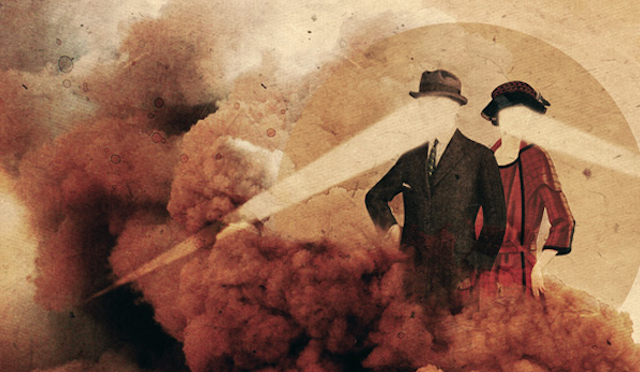Intruders by Steve Patterson
“Standing in the cold. Seeing his family as a stranger would.”
Fiction by Steve Patterson
+++
The raccoons again, banging around. Wearily, he pulled on a shirt and jeans over pajamas. Jacket, flashlight, house keys. Rifle. Stepped into cold, breath on air: chase off their little bandit masks before they could overturn the trash cans. Again. Heard a scurry as he opened the back door.
They’d be back—that battle already lost. He couldn’t stay up every garbage night. And they’d wait him out. What else did they have to do? He even tried running a cable through the can handles, then slept through the trash trucks’ rumble and clatter. Heard about garbage smells for two weeks. (When did they move to every two weeks?) In the midst of meetings, he imagined he could smell trash.
Self-conscious, he told Jennings about the cans—just in case. Mistake. Insisted he take the gun. Remington 597, shooting .22 long rifles, aftermarket 30-round magazine, 20-inch barrel, 5.5 pounds, 150-yard range, muzzle velocity of 1,750 feet per second. Flash suppressor. Light recoil.
Sometimes he slipped, thought about another dog. That would work. But he couldn’t see leaving even a big furry dog out all night in the cold. Still: the kids would love a dog. Jumping, barking upon his return from work. Warm head on his lap, hand curled behind an ear. But dogs—dogs ended badly. Backyard burials. Never going through that door again.
So another problem without a solution. Every two weeks, unavoidable. He shivered, creeping stealthily in bedroom slippers. Walked a slow perimeter around the house. Shining the flashlight below shrubs. Briefly a spy in a movie: if he could surprise—ambush—them, they’d be so frightened that they’d never return. Knowing full well smart animals didn’t work that way, that he’d never actually shoot one. Never even saw them. Just the muddy track he’d worn around his house and the decoration they’d added with their prints.
Coming round the corner, onto the patio, he shut off the flashlight, spillover from the family room shining through sliding glass doors. Standing more or less invisible to his family, interior reflections blocking his image, he saw them like figures in a diorama. Kids on the floor, supposed to be studying but faces lighted blue by the television, by a phone screen. His wife on the couch. Eyes closed, mouth slightly open. A tough day, she said. Yeah. Whiskey spearmint. Finding the flask at the bottom of her car’s glove box. Meant to talk to her—an open container while driving. Didn’t like her cough, though. Didn’t like the spot on his arm—age maybe? All of it, exhausting.
God: the telephone, e-mail, texts. The struggle to concentrate amidst constant interruptions. Odd, intrusive concerns. Work, did they like him? Things switching around, org charts. And out the window, the parking lot, watching his car every time someone backed out. Holding his breath. Sometimes, he had to hang the do-not-disturb sign on his door, crouch out of sight behind it, repeatedly thinking: work is no place to cry. The clock watching him. He once joked: another day, another glass ceiling…to fall through. No one laughed.
So he’d burrow deep into a project, only to get caught by sudden memories. Walking on a gray evening. Waiting for a flight but not the destination. Watching thunderheads form above a supermarket. Counting taillights ascending a hill. Four times in the last two months, he’d almost missed his exit, his mind still driving down the road, busy recalling the meaningless.
Like maybe now. Like maybe right this minute. Standing in the cold. Seeing his family as a stranger would. Having just climbed the hedge in darkness. Crept across the patio, avoiding the rusting grill, the dried-out flower pots. Invisible.
Ashamed to be holding a rifle with the raccoons silently watching.
+ + +
If you liked "Intruders," you might also enjoy reading "The Pull to Keep Going" by Holly Goodman, here.
Header image courtesy of Julien Pacaud. To view a gallery of his collage, go here.
Steve Patterson’s plays have been staged in Portland, Los Angeles, Chicago, Tampa, and other U.S. cities as well as in Canada and New Zealand. His full-length works include the war plays Waiting on Sean Flynn and Liberation (Original Works Publishing). In 2008, his play Lost Wavelengths won the Oregon Book Award. He is a founding member of Playwrights West and Pavement Productions, and has served as the Dramatists Guild of America’s Regional Co-Representative for Oregon.


